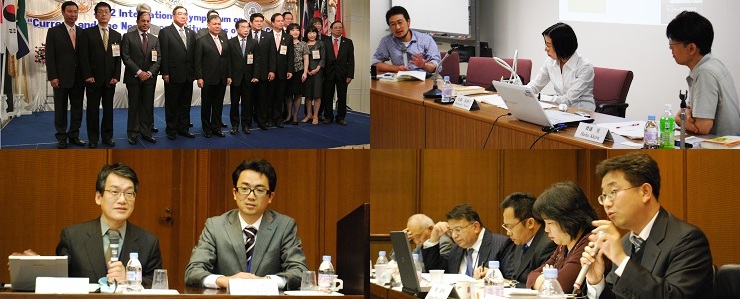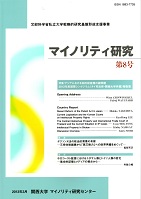'Good Constitution' of the Global Civil Society;
From the Perspective of Minorities
Who we are: Our research project focused on using “minority” as a means to access alternate images of the “State and Society” that diverse citizens, who we call “Global Citizens”, design for this research project has described a twenty-first century version of the State that would never have been accessible to us without tackling the minority issues borne out of the formation of the Nation-State. This research consisted of three main threads: (1)studies to construct the theory of the twenty-first century model of the Nation-State, i.e., a contemporary theory on the state of Global
Citizens as well as on the society of the Global Citizens, (2)studies to redefine “minority” by adapting the diverse possibilities of minority issues that are generally overlooked, and (3)studies to construct a foundation for studying minority issues from an interdisciplinary perspective within a constant international network of scholars and practitioners who study minority issues.
What we have achieved: We have actualized every subject originally written in the pre-submitted file of the five-year project concept. Among them, the following publications are worth noting: From the Perspective of Minorities, Vols.1 and 2 (Osaka: Center for Minority Studies, 2011), Differentia and Community (Osaka: Kansai University Press, 2011), and “Others” in the Multiplicity (Osaka, Center for Minority Studies, 2013). These publications form the corpus of our project members’ achievements and include research awarded by the Thirty-first Suntory Prize for the Social Sciences and Humanities. The publications and research award have allowed us to redefine “minority” and to propose new perspectives toward the Twenty-first century model of the Nation-State and toward alternate perspectives of “integration” of national people.
Secondly, we have held the “Seminar on Minorities” twenty-three times. Seminars participants were both nationally and internationally respected frontrunners of minority studies who presented up-to-date research. The first seminar, in particular, was unforgettable because it was an epochmaking event of discussions with key agents and scholars about Chinese ethnic problems.
Thirdly, we have held three international symposiums. At the first symposium about “Constitutional Issues for Minorities”, we invited American, Chinese and Japanese representatives of academia involved in Minority Studies. At the second symposium, we invited seven Asian judges to discuss practical issues of minorities in their courts. Also, the third symposium, with the corroboration of the Offi ce of the Judiciary of Thailand, was held with eminent judges from ten diff erent countries and regions who discussed intellectual property rights and how they aff ect the issues of minorities. These seminars are proof that we have been able to provide an international research network of both scholars and judges, thus overarching conventional networks with scholars only.
Lastly, twelve volumes of the newsletter Boundary have been published
in order to showcase our research activities and achievements. We have, furthermore, issued eight volumes of the journal, The Journal of Minority Studies, which not only introduced current international aspects of Minority Studies but also was a frontrunner in such studies. Our contributors came from sixteen different countries and regions, and used six different languages.
Where we have reached and where we will go: We have contributed to the development of Minority Studies nationally and internationally with the publications noted previously. In addition, realization of the international
network between scholars, research institutions, and courts, has added immense value to the future and value of Minority Studies worldwide. After termination of this five-year project, Kansai University will face a critical question about how to continue these research achievements in Minority Studies (For closing remarks regarding this topic, please refer to the publication, “Others” in the Multiplicity, Vols.1 and 2 (Osaka: Center for Minority Studies, 2013)).
Nobuo KOCHU
(Director of the Center for Minority Studies)
Citizenship and Minorities
State-Formation and Minorities
International Relations and Minorities
JAPANESE



